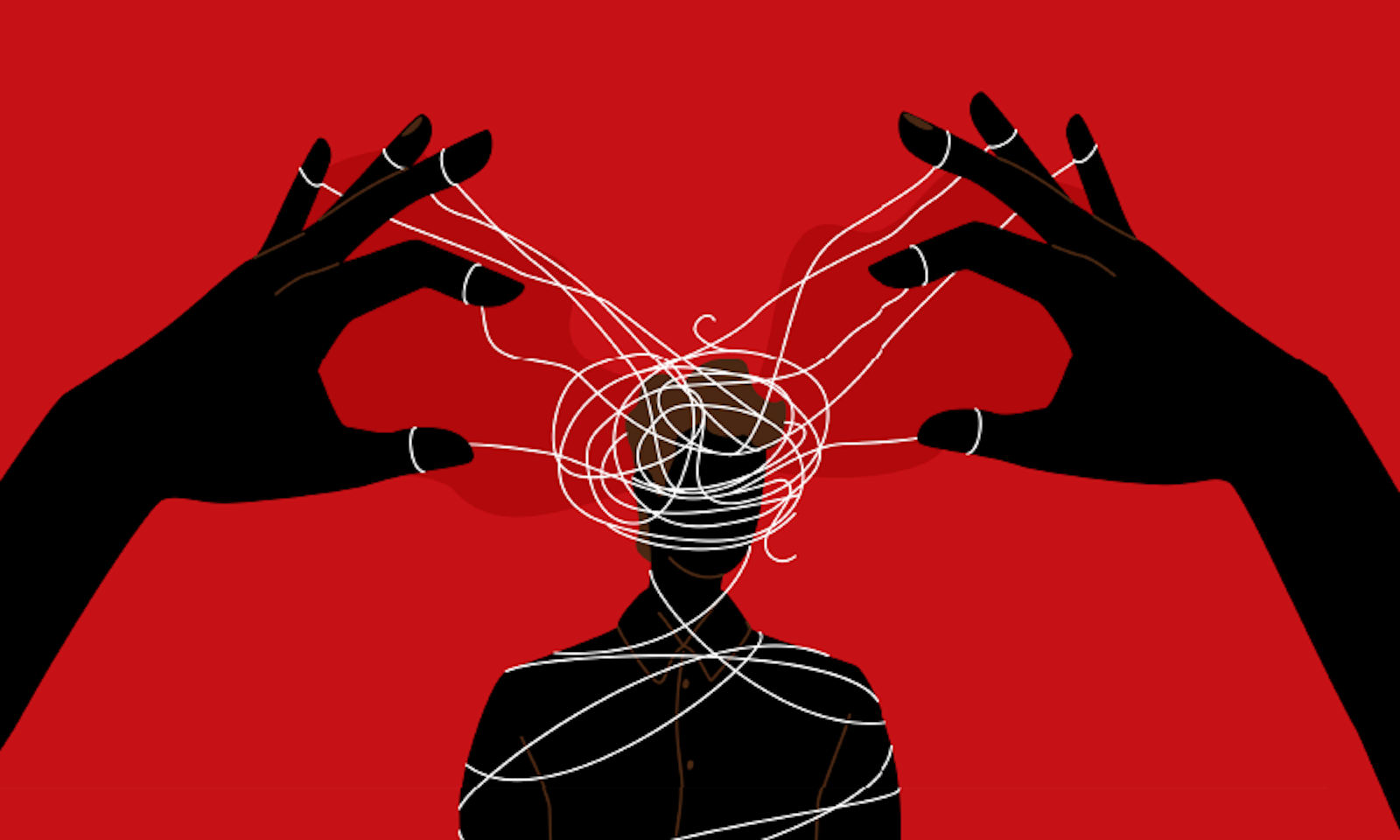In 2017, Simon McCarthy-Jones wrote an article about schizophrenia for The Conversation. The piece, he jokes, got read by more than two people, which, as an academic—he’s an associate professor of clinical psychology at Trinity College Dublin—was a thrill. Shortly thereafter, however, he found himself “just gripped by the iron claws of Facebook,” looking over and over again to see who had liked his article, who had commented on it. It was “grabbing my attention, making me think, ‘Check Facebook! Check Facebook!’” he said in a recent video call from his office in Ireland.
Was his thinking being covertly, coercively controlled by external forces (in this case, a big tech company)? The experience got him wondering just what “free thought” actually was. And so he started wading into the murky waters of the psychological, philosophical, cultural, and legal assumptions about what constitutes thought—and how it could remain truly free.
His intellectual quest has exited his head, as much thought eventually does, and now exists in the form of a new book: Freethinking: Protecting Freedom of Thought Amidst the New Battle for the Mind.
We caught up with McCarthy-Jones, who walked us through the history of criminalizing “thought crimes,” the physical boundaries of thinking, and how architecture and urban planning are essential for truly free thought.

The subtitle of your book makes me wonder how you would define the “new battle” for our minds—and if you think that war currently has more than one front?
I think there are four fronts in the battle: There are threats from states, threats from corporations, threats from individuals, and then there’s the threat from the law—in the sense that if the right to freedom of thought is defined very narrowly, we can leave a lot of thought unprotected from the threats from a new technology.
This last one is a hard one. We talk a lot about brain-reading devices being on the horizon. Elon Musk’s Neuralink keeps popping into the headlines with the idea that he’s going to create some kind of brain-computer interface that will allow us to have our thoughts directly translated to a computer. But the question is: How realistic is this type of technology—and is it a threat we need to think about now? My concern is that this has the potential to slip into a bit of a moral panic.
I think what’s maybe a more immediate threat from new technologies is not brain-reading but more what is called behavior-reading. That is, the idea of measuring our observable behavior—what we like on Facebook, what websites we visit, what music we like, etcetera—that from knowing those facts about us, people could impute our mental states and can have a good idea of what it is we’re thinking—and knowing what kinds of buttons they should press to get us to act in a certain way. The combination of that knowledge with AI technologies could be a really huge threat to our autonomy.
In a way, it’s a new technology giving a new perspective to an ancient problem. In ancient Greece, there were concerns about sophists—people who would use argumentation not to reach the truth but to support certain politicians or political ideas. So the concern about sophistic arguments has been around for thousands of years, but now we’re looking at AI as a digital sophist, with a huge power imbalance between what it knows about us and how our minds work—and us as mere mortals.
We might want to say: No, we’re independent, autonomous thinkers. But I think we have to recognize that in front of a persuasive AI, we are in deep trouble.
To let others think for us is to let others live for us.
Of course we would like to think that, outside of science fiction, what’s inside our craniums must remain our last, private dominions. But you note that we shouldn’t be lulled into believing this fantasy. How is our own free thought being protected?
When I began looking into this—as a mere psychologist and not as a lawyer—there were two things that initially excited and then later terrified me.
The first was that the right to free thought is an absolute right, based on the United Nations’ Universal Declaration of Human Rights. In the United States, it’s as close to an absolute right as there is in the Constitution. And that’s quite exciting because it means that nobody can interfere with your freedom of thought. There are instances where you can limit someone’s speech if it’s defamatory or false advertising or fighting words. But thought is unimpeachable, you can create absolute protection for people’s minds.
But I started to worry about the power of this. Because if it’s not balanced with other social concerns, it can overrule other social interests. For example, you might think that freedom of thought and freedom of speech are natural bedfellows, but the problem is, if you were to claim that a person’s speech was manipulating your thoughts, you could create new limitations on speech in the name of the right to freedom of thought.
And the second thing, which is possibly even more troubling, is the lack of definition of this right. When you look at it closely, there’s nothing there. It’s effectively hollow. It’s bizarre how people through the ages—Jefferson, Voltaire, Chomsky—everyone’s been lauding this right. But in some senses we’ve been so busy lauding it, we haven’t defined it. So even though it appears to be protected, in reality, it’s kind of naked and exposed and very fragile.
The U.N. has tried to define it more recently, but you think they haven’t gone far enough?
In 2021, the U.N. issued a special report that included four pillars of freedom of thought: Immunity is the idea you can’t be punished for your thoughts. Integrity is the idea that you can’t manipulate other people’s thoughts. Privacy is the idea that you have a right for your thoughts to be kept private. And fertility is the sense that the state has a duty to create environments for its citizens for freedom of thought.
But there are still these lurking, fundamental questions, just beneath the ice. Questions such as: What should count as thought? And what makes thought free? How you answer those questions is going to have profound consequences for the extent to which you are actually protecting thought—or how much thought you are leaving vulnerable and unprotected.
Is this in some way also protecting—as Descartes’ words, I think therefore I am, might suggest—our own personhood, or even our autonomous existence?
Yes, I think thought allows us to decouple from the world, and have this kind of private workspace, where we can create plans, intentions, and unlink ourselves from the demands of the environment and be reflective—and control our actions from the inside. So I do think it plays a central role in us being autonomous.
But by talking about Descartes, we are kind of subscribing implicitly to this idea that thought is something that happens inside the head. I see a lot of legal writing on this, where people talk about protecting the inner world, what they call the forum internum.
It seems to me that can’t be all that we protect. I think a right to freedom of thought that just protects the inner world would abandon more than it would save—because we do a lot of our thinking externally, outside of our heads. As philosophers, technologists, and psychologists would say, there’s this important kind of external thought that we need to protect: We count on our fingers, we make shopping lists, we think with technology (like with a Google search), we think with each other through speech.
People would prefer to give themselves an electric shock than sit quietly with their thoughts.
And that’s what you refer to as thought-speech?
Yes, this—although it takes the form of speech—is actually us thinking with others. As E.M. Forster talks about: “How do I know what I think until I see what I say?” And when we speak with others, it’s quite possible we’re often just thinking with others.
There are a bunch of psychology studies showing that, in the right conditions, we’re more likely to get closer to truth when we think together as a group, rather than as individuals. Psychology research also suggests that in order to have the best chance of getting closest to a truth, you need to have a group of people with a diverse range of ideas in a room. So it’s about creating those spaces. During the Enlightenment, you had the coffee shops across Europe, where you would have space for these kinds of debates—though obviously they weren’t terribly inclusive spaces that could bring a diversity of opinions. The question now is: How can you get that diversity of views?
Obviously, we now have online spaces. But unless you’re rich or reckless—or a combination of both—it’s very difficult to think out loud in those spaces. And if we don’t make people feel safe in those spaces, they don’t feel comfortable to raise their voices, and you can’t get closer to truth.
The idea of protecting this sort of thinking eventually led you to … urban planning?
One of my colleagues from Brazil and I were talking at a conference, and he was telling me about how the design of their capital city, Brasília, was intentionally put together by planners to try to avoid street corners—because street corners were places where people would be able to assemble and potentially think things together, which could be threatening to the ruling regime. So city planning can have an important effect upon the public’s ability to think together.
It’s also thinking about what kind of things promote free speech. So it’s also biophilic design, the idea that being able to walk in green spaces is conducive to thought. Or the things that might help us design our libraries—which in the past would have been dark, dusty spaces—with more light and spaces for breakout conversations. So it’s designing buildings and spaces to promote thinking together.
We also now, of course, live in a digital world that might not be so conducive to this sort of free thinking, right? The U.N. notes that we should have the right to unmanipulated thought. But we’ve all had the experience of our own focused attention being taken from us. Nevermind strange ideas like QAnon conspiracy theories being pushed out across the internet. Is there a way out? Or are we already failing?
There is a way to design tech products to—instead of pushing us, through algorithms, in a direction we’re already rowing in—a default mode of more “free-thought” options, giving you a more diverse range of opinions. This would help with the problem Donald Rumsfeld talked about—”the unknown unknowns,” the things we don’t even know we don’t know.
It might also help counter what some call “legacy beliefs”—ideas we’ve acquired at some point but we’ve never really thought about them. To take a fairly heavy example, you might point to democracy, a concept which I think many of us would take as being an unblemished good. But have we reached that belief by ourselves? Have we ever really heard the arguments against it, in order to be swayed out of believing in the benefits of democracy or to help us to really see why we believe in democracy?
Or as a more trivial example, which surprised me: I’d always believed that eating carrots helped you see better in the dark. Obviously carrots have beta carotene, which if you’re severely deficient can improve your vision. But during World War II, the British were making radar but didn’t want the Germans to know. So they had to come up with a cover story as to why these British pilots were shooting down all of these German planes in the dark. The cover story they came up with was that carrots were being eaten in vast quantities by the British pilots. And that belief just got into the culture. So how can we even find out what things we’ve been believing for bad reasons?
If we sacrifice that ability to think, to what extent are we still human?
One can’t talk about free thought without bringing up George Orwell’s 1949 book, Nineteen Eighty-Four. And as you point out, even decades before that—in the 1920s and ’30s—in real life, Japan’s ruling government had laws that criminalized “thought crimes” to try to stifle dissent. Is there ever a situation in which free thought should be questioned, say, as you mentioned before, if it’s being abused to stop free speech?
That’s one of the controversial areas—whether there is ever any rationale for limiting thought. At the moment, it’s an absolute right. And we have a kind of Orwellian knee-jerk reaction to the concept of “thought crimes.”
But the philosopher Sam Harris has talked about the possibility of, with the help of reliable brain-reading devices that can detect lies, creating “zones of obligatory candor.” For example, in a courtroom, you might be mandated to wear this technology to detect if you were telling lies. On the one hand, this would be a gratuitous violation of freedom of thought. But would society say that’s okay in that space?
I loved the line from your book: “To let others think for us is to let others live for us.” Is that a sort of distillation of the issue for you?
That’s what makes us unique as a species. We have the ability to think things through. We’ve lost our sharp teeth and our claws. But what we’ve been given to survive in this world is thinking, and that’s a large part of what contributes to making us human. If we sacrifice that ability to think, and give that away, then, to what extent are we still human?
At the end of the day, though, we aren’t actually often drawn toward thinking, right? We evolved to conserve energy, and cogitating takes a lot of effort. In fact, you mention a series of studies that found people would prefer to give themselves an electric shock than sit quietly for 6-15 minutes alone with their thoughts. Was that surprising to you—or not so much, as a psychologist?
There’s a quote by Daniel Kahneman, the Nobel laureate, who said: “Human beings are to independent thinking as cats are to swimming. They can do it, but they prefer not to.”
There are certainly times in my own life where I just don’t want to think! And technology makes that easy. For example, YouTube gives us access to a pile of information. And you might think that’s going to be helpful for thinking. But do we sometimes use YouTube as, like, a digital benzo, in the sense that we use it to calm our anxiety?
In the old days—old days for us anyway—when you were doing the washing up or mowing the lawn, you’d have time to think. And these days, we increasingly seem to be accomplishing these tasks with headphones on, with YouTube and podcasts. So are these inputs helping us think? Or are we stopping ourselves thinking by importing other people’s thoughts, every hour of the day?
The question becomes: How do we rediscover the joy of thinking? How do we enjoy the effort of thinking? Because if we don’t really want to think again, there’s no point in setting up a society that’s going to make us do something we don’t want to do, right?
What changes have you made in your life to help protect your ability to think more freely?
The first thing I did was to get off all forms of social media. That could, arguably, be an overreaction! I’m well aware Twitter can be a fantastic source of new ideas. But there’s a balance to be struck between the extent to which it grabs your attention and draws you away from your own goals. For me, it did more harm than good.
I also think it’s quite easy to point the finger at social media and say it was to blame for my attention being pulled away. But we also need to look at who’s behind the pointing finger. It may be our own vanity or vainglory or pride that draws us into these social media “likes,” where we keep looking for mentions of ourselves. So I think that rather than placing the blame entirely on the shoulders of social media, we maybe also need to examine our own motives and where we’re trying to get our own self esteem—and try to manage ourselves more effectively.
The other thing I did was add other types of thinking. As an academic, there’s a temptation to lock yourself in a room with a paper or a book and feel that’s the best way to progress. But when I saw all the research showing just how valuable thinking with others was and the extent to which our thinking is improved by talking to others, it has forced me—as kind of an introverted person—to try to engage more with other people in different forms of conversations, in spaces that are conducive to free thought—spaces where you’re talking to people who you trust, in a safe environment, where you can challenge your own ideas with a diverse range of opinions.
And there is quite a lot of research linking thinking with walking—especially in nature. So I’ve tried to actively do more thinking on the move, do more walking. And of course in doing so, I’m walking in the footsteps of many philosophers and psychologists.
And walking without podcasts or music.
Yes, leaving the earbuds at home. ![]()
Lead image: Zaie / Shutterstock




























